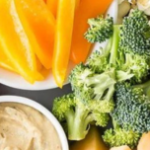Enjoy this guest post from Big Sky Newington Coach Andrew LeDuc.
Andrew is an NASM certified personal trainer that holds a total of five certifications within the health and wellness industry. He’s passionate about helping his clients build strong and resilient bodies through functional resistance training!
 Why Protein May Be the Key to Unlocking Fat Loss
Why Protein May Be the Key to Unlocking Fat Loss
What Is Protein?
Protein is one of the three macronutrients that comprise food and is integral to building and repairing tissues in our body. It’s also, arguably the most important macronutrient when it comes to weight loss. Below, We’ll describe three ways protein can help aid with fat loss. We’ll also describe strategies on how to shop for protein dense foods!
How can protein help with fat loss?
There are three main ways protein can help aid with fat loss.
- Protein helps us feel more satiated (feeling full) than carbohydrates and fats.
It does this, in part by reducing the levels of the hunger hormone ghrelin in the body! Ghrelin helps by telling the brain “you’re full”.
- A high protein diet combined with resistance training, will help us to retain muscle mass while we’re losing weight. To understand why this is so important, let’s use an analogy… let’s assume you had $10,000 dollars in cash and were deciding between two banks to put your money in. Bank A has a 4% annual interest rate, and Bank B has a 0.5% annual interest rate. That means you would earn $400 in interest if you chose bank A or $50 worth of interest if you chose Bank B. It would seem like a no brainer to put your money in Bank A right?
In this scenario, muscle mass is equivalent to the interest rate of Bank A, and fat mass is equivalent to the interest rate of Bank B. Muscle mass burns more calories at rest than fat mass does. This boosts our metabolism and helps us burn more calories throughout the day. Muscle mass is the investment we want to choose if we’re trying to sustain long term weight loss. A high protein diet helps build and retain muscle mass and therefore is crucial to this process.
- Lastly, protein has what’s called a high “thermic effect of food” (TEF). This is a fancy way of saying we burn a lot of calories when digesting protein! When eating 100 calories worth of protein, our body will use 20 to 30 calories in order to break down and digest that protein, so it’s really like we only consumed 70 to 80 calories! While protein has a TEF of 20 to 30 percent, carbohydrates have a TEF of 5 to 10 percent, and fat 0 to 3 percent! Protein is a clear winner in this category!
How Much Protein Should You Eat?
The research shows that eating 0.8 to 1 gram of protein per pound of your goal body weight per day is ideal when trying to retain or build muscle mass. In other words, someone that has a goal of wanting to weigh 180 lbs should be shooting for anywhere from 144 to 180 grams of protein per day.
If your goal is weight loss, it’s also important to eat foods that have a high ratio of protein to overall calories. Along with our protein goal of 0.8 to 1 grams of protein per lb of body weight, we also want to aim for about 25-35% of our overall calories coming from protein.
Let’s use peanut butter as an example. Peanut Butter has 8 grams of protein and is 190 calories per serving. At first glance, 8 grams of protein might seem pretty high. But remember, we also want to look at the ratio of protein to overall calories. There are 4 calories in a gram of protein. If we take 4 calories and multiply that by 8 grams of protein, we can determine 32 calories are from protein in one serving of peanut butter. 32/190 = 16.8% calories from protein. That’s actually a pretty low ratio!
Let’s use eggs as another example. Three eggs have a combined 18 grams of protein and 210 calories. Using the same equation from the previous example, we can determine that 34.2% of the calories in an egg are from protein! This is double the ratio of peanut butter and nearly the same number of calories! This equation takes merely seconds to use in a grocery store and will help you shop for lower calorie, protein dense foods!
Summary
A high protein diet will play a critical role in your fat loss journey. This will be done by helping with satiety, boosting metabolism by building and retaining lean muscle mass, and incinerating more calories through digestion. Make sure to choose foods that are protein dense by using the simple equation described above when grocery shopping!
See you at Big Sky!
* Open to both Members and Non-Members. Must not have done Personal Training, Team Training or a Team Training Trial in the past 6 months.




